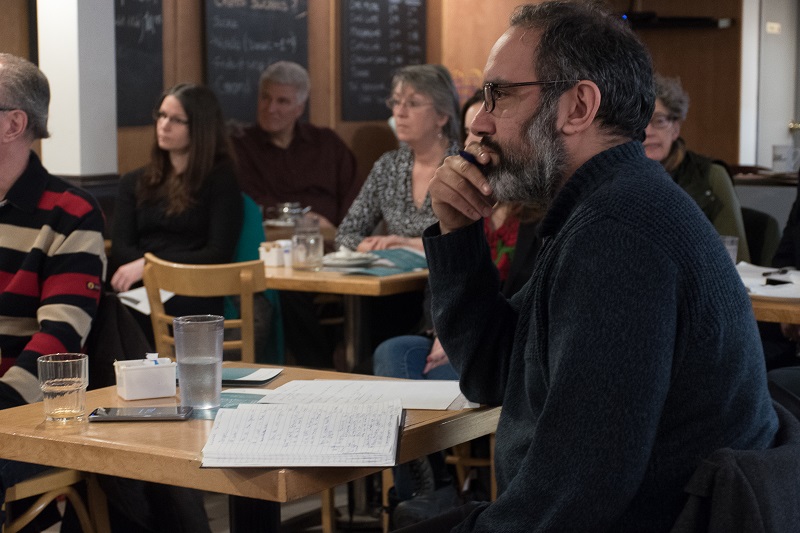A University of the Streets Café discussion reflects on the “pursuit of happiness”
University of the Streets Café hosted yet another edition of its public discussions at Café Aux Deux Marie on St-Denis Street last Wednesday to discuss a hefty topic—the illusive pursuit of happiness.
The talk was moderated by Anurag Dhir, a community engagement coordinator for McGill University’s Social Equity and Diversity Education Office. The event featured speakers who explored the idea of purposefulness and happiness in their line of work: Peter Hartman and Juniper Belshaw. Hartman is a motivational speaker and founder of Happy For A Change, an organization that looks to spread the word about positive global initiative. Belshaw currently works for the Cirque du Soleil as a senior advisor for talent management, but she used to work and volunteer a lot in the non-profit sector.
The atmosphere of the talk was quite relaxed. Once the speakers made their preliminary addresses, participants were encouraged to join in on the discussion.
While the intention of the talk was to discuss how to lead a life of impact within a community, the natural course of discussion led to the attendees sharing their views on what happiness means to them, and how to achieve a life of happiness. Most of the audience members agreed that living a life of happiness begins with the acceptance that things happen, and one can’t control everything.
There was a general consensus that, to live a life of positive impact, one must first find positivity in their own life. This echoed the sentiments of Belshaw, who at the end of her introduction said “maybe tonight I’m hoping to talk about how we build sustainable social change where we’re creating the world we want, but also living it as we do it.”
Peter Hartman, who also organizes discussions about finding a purpose in life through his organization Happy For A Change, said he’s used to hearing a lot of discussions turn into talks about the pursuit of happiness.
“There is overwhelmingly this focus on happiness,” he said. “I was hoping we would get beyond that… but I find it so useful, because every time we have that conversation we get a little bit further,” into what it means to lead a life of purpose.
Hartman explained that, for him, living a life of purpose means living a life of meaningful action. “It’s when there is intention behind the actions that you do,” he said. “It’s not just that you have relationships—it’s the manner in which you have relationships that contribute to your overall purpose.”
Relationships, Hartman added, can be as basic as the contact a person has with a store clerk.
This and other guiding principles are the basis of Happy for A Change—what he calls a philosophy and a movement—with the goal of using people’s own search for happiness to make a positive change in the world.
“We understand that everybody is different and people want to work on different things, so we’re trying to find the lowest common denominator, what is the smallest action possible that we can convince people to do that would create change?” said Hartman. For the speaker, that action is going on social media. Hartman believes that going on social media is something that practically everyone does every day and he tries to harness its power by convincing people in the self-help industry to use their financial means to promote and market ideas that create a better society on social media.
University of the Streets Café is a program part of Concordia’s Office of Community Engagement, which has existed for 15 years. According to Alex Megelas, the organizer of University of the Street Café programming, their mandate is to “promote a culture of community engagement at Concordia.” They do so by creating links between staff, students and different community based groups and organizations. University of the Streets Café is one of their initiatives.
Megelas said his principle role is to create discussions that reflect the goal of the program. This year, their goal is to look at city engagement and, more specifically, “how we live in cities as, individuals and together, [and] create shared experiences.”
The next University of the Streets Café discussion called “Representative Democracy: How do we foster citizenship literacy”, and will be held on March 9 at 7 p.m. at Temps Libre at 5606 De Gaspé St.
